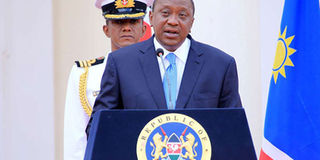Kenya at a crossroads: Choose either bad angels or good devils

President Uhuru Kenyatta addresses the nation at State House in October last year. He is determined to wipe out corruption. PHOTO | FILE | NATION MEDIA GROUP
What you need to know:
If Kenya hadn’t devolved power in the 2010 Constitution, there would be fewer corrupt mouths suckling the breasts of The National Treasury.
Yes, in a dictatorship, with a president determined to wipe out corruption, the corrupt couldn’t go to court and buy their way out.
If you are not strong of heart, Kenyan news and social media can give you a panic attack. It feels like the country is, well, going to fail, or has failed.
Not so, if you consider how we got here. Partly out of political progress, the devolution of power to the 47 counties and their often-bizarre governors, the “eating points” have multiplied that many times over.
While in the past you had stories of corruption mostly in the central government, today you still have an outpouring of graft tales in big government at the centre, and the 47 others. It can be overwhelming.
And then there is the very arcane politics of succession, given that President Uhuru Kenyatta is serving his second and last term, and will have to depart State House in 2022.
In what is seen as an attempt to establish a legacy, partly by dialling down the sharp divisions spawned by the bitter 2017 election, he did the famous “handshake” with his erstwhile foe, Opposition chief Raila Odinga, a year ago, and totally upset the succession in the process.
GRAFT
Related to that, he launched his anti-corruption drive — that has run into headwinds — in a bid to rewrite the last chapter of his presidency.
In practical terms, the plan was that reducing corruption would allow resources to flow to his “Big Four” development agenda (food security, affordable housing, manufacturing and universal health coverage) and, therefore, cement his legacy.
But because Uhuru almost certainly has to leave in 2022, he is seen as a lame duck, and thereby is unable to stamp his authority firmly on the succession, or push through what needs to be done to achieve the “Big Four”, without the crooks gnawing away at the money to fund it.
On most days we would leave this matter here, but not this time. If you think of it, if Uhuru was a “developmental autocrat”, and if Kenya didn’t have term limits, he would not be losing sleep over 2022. He would be no lame duck.
JUBILEE
If Kenya hadn’t devolved power in the 2010 Constitution, there would be fewer corrupt mouths suckling the breasts of The National Treasury.
And, because the feeding frenzy derives from the uncertainty many in Jubilee feel about the real possibility that the party as it is today will not be in power after the next three years, fellows are collecting their pension early through corruption.
Without the uncertainty, the corrupt would still steal, but they could afford to be leisurely and measured, knowing they have 20 years — possibly even 40 — in power, to build up their nest eggs.
In short, the pain and drama Kenya is going through isn’t just explained by the cynical calculations of those in power, but also by the democratic structures the country chose.
Indeed, if one follows Kenyan social media closely, it’s evident that some see this point clearly and, therefore, argue that the country would be better off as a dictatorship.
GOVERNANCE
Yes, in a dictatorship, with a president determined to wipe out corruption, the corrupt couldn’t go to court and buy their way out.
With a highly centralised authoritarian regime, you would have no governors and members of the county assembly (MCAs) chopping off their bit — unless they did so because the dictatorship is corrupt, then you would not do anything about it.
And, no doubt, you wouldn’t read about any of this in the newspapers or see it on the evening TV news.
As a strongman without term limits impinging on his tenure, Uhuru would have been — as we have seen elsewhere in East Africa and the continent in general — able to jail his opponents and rivals and wouldn’t need to resort to political ploys like “handshakes” and hugging adversaries.
Kenya is a mess, for sure. But it is a good mess. That is because its political problems are actually small, though they might not seem so.
It achieved extensive devolution of power, to the soundtrack of the 2008 post-election violence, yes, but in peacetime.
REFORMS
The limitations the democratic gains have placed on the Executive, and politicians in general, is such that they can do handshakes, cajole, bribe, do anything but disappear or imprison opponents into submission or single-handedly rewrite constitutions to extend their rule.
The better point, then, is to ask what price Kenya is willing to pay for being a democracy, and what reforms might improve governance, rather than the demand to reverse all the liberal gains of the past two decades in the vain hope that a country that has failed to produce perfect democrats will somehow pull a skilful benevolent dictator out of its hat.
Where the angels are chased out, often it is the devil that takes their place.
Mr Onyango-Obbo is the publisher of Africapedia.com and explainer Roguechiefs.com. cobbo3





